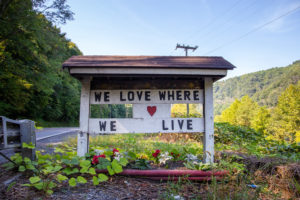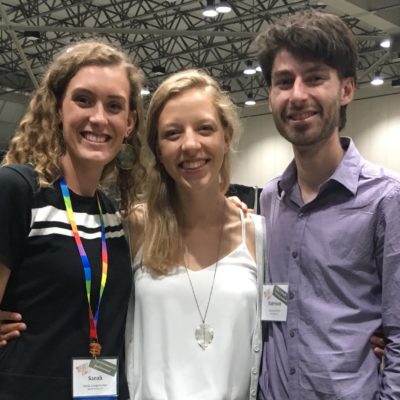It was an unusual first gig out of college: Travel the country interviewing people from all walks of life. Take photos. Create podcasts. Think about climate change eight hours a day. Help others wrestle with complex issues and understand each other.

Photo by Sarah Longenecker
Thanks to support from the Center for Sustainable Climate Solutions (CSCS), Michaela Mast, Harrison Horst and Sarah Longenecker were able to share this unique and challenging experience. The three recent graduates of Eastern Mennonite University concluded their yearlong fellowship with CSCS in July 2019 and reported on their sojourn at MennoCon19. They were weary but still positive about the people they had met and the conversations that resulted.
Real people, faith and climate change
The trio was on the road a total of two months, ranging from New Haven, Connecticut to Flagstaff, Ariz. Back in Harrisonburg, they shaped their interviews into 15 podcasts with matching photo essays designed to “rehumanize the conversation around climate change.” They hoped to create a kind of interaction around faith and climate change that they felt was missing in Mennonite dialogs on the subject.
“We were surprised people were willing to converse with us on climate change,” Michaela said. Often the connecting point was Christian faith.
“If you guys weren’t Christians, I wouldn’t be talking to you,” a West Virginia pastor told them. “But if I believed in climate change, I think I would do what you are doing,” he added.
The interviewees were farmers and academics; environmental professionals and homeowners; people who could describe cement factories and people who could describe uranium mining. Michaela, Harrison and Sarah provide thoughtful commentary and link their interviews to big picture questions.
Effects of climate change not distributed equally

Photo by Sarah Longenecker
One takeaway the group noticed was that social class was a good predictor of vulnerability to climate change.
“All across the country, lower income people were affected by climate change; wealthier people were not,” Harrison observed. Another example of inequity involved a Navajo family that had many health problems related to uranium mines in their area. While the white ranchers next door received compensation, they did not.
The Shifting Climates podcasts are available at https://shiftingclimates.com/.
Each is a half hour to an hour long and would make good discussion prompts for a Christian education class. They can be used piecemeal or in sequence.
